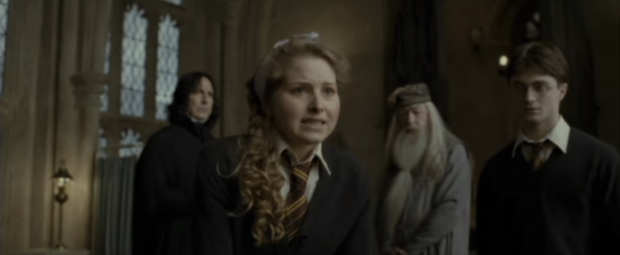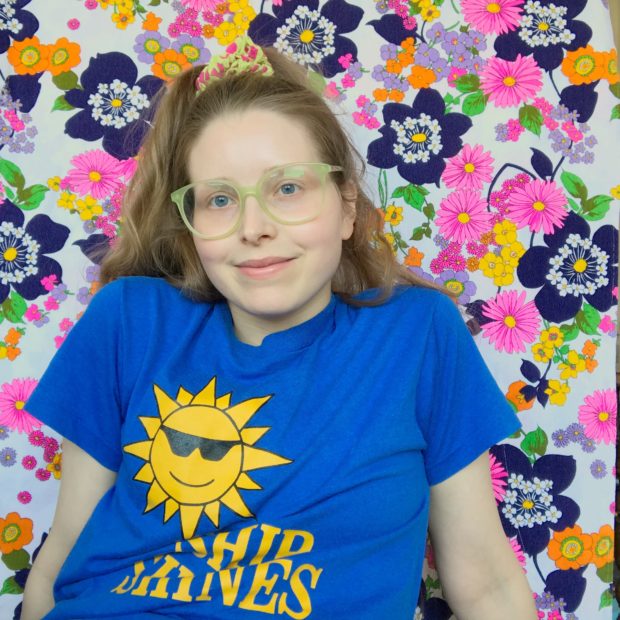You have no items in your cart. Want to get some nice things?
Go shoppingIf you want to get familiar with the themes of Jessie Cave’s work, a good place to start is a short video called Animals. In the sketch, Norwegian comic Daniel Simonsen plays an overly friendly guy who meets Cave in a waiting room and starts making awkward small talk about cats and dating. The tone abruptly changes when it transpires that Cave wants kids.
He looks uncomfortable. He hesitates. He asks how many.
23, she says. Or seven. “But yeah, I wanna adopt, I wanna have them biologically, I wanna have sperm donor babies, I wanna have a child with the man I love, or many men that I love, I wanna have, kind of like, kind of a huge, just, brood of children.”
He listens. He nods. He leaves.
For years, this sketch was my favorite thing on the internet. It’s still rare to see such a woman portrayed with anything approaching dignity. She’s at once incredibly wholesome and freakishly aberrant. She makes the most conventional construct in the world, motherhood, seem like an eccentric enterprise all of her own. And that’s cool. In a world where women are still admonished not to scare men away with their intensity – to temper our humanity for the sake of someone else’s comfort – seeing that kind of outsider in a sympathetic light was a balm for my peculiar soul.
I watched that sketch for the first time six years ago, when I was 23. It was a life-changing find. I watched it again and again and again. Forget the fact that Simonsen’s character makes up the flimsiest imaginable excuse to leave – that’s not the point! The point is that a high-strung woman with outlandish baby aspirations is the protagonist of the story. She’s allowed to say everything. No one cuts her off. No one relegates her to a punchline. She doesn’t fade into the background of the more significant drama of some archetypal young guy learning about the world through the women he fails to love. Sure, we’re still laughing at her – but it’s a sympathetic laugh. We stick with her until the final frame.
You could say Cave’s been playing the clingy girlfriend ever since her Harry Potter days, when she was cast as the love-potion-concocting Lavender Brown. It was smart casting. She excels at frank mania. But her Fringe show, Sunrise, is a far cry from Lavender. It’s a mature work that explores parenthood and womanhood from the vantage of a symphonically agitated mind.

No longer making jokes about scaring men off with her procreative fantasies, Cave is now a single mother of two. Her ex-boyfriend and co-parent Alfie Brown also has a show at the Fringe, called Lunatic. Like Cave, he’s perfected the well-timed frenzied outburst. The comics steer clear of self-justification and bitterness, choosing instead to entertain. The result is that their shows are compelling even if you have no idea who either of them are.
What the two have in common is radical honesty. They just happen to be revealing radically different things.
At a glance, the comics’ onstage personas take binary gender roles to the extreme. She waxes hysterical about missing her ex; he divulges the dirty thoughts he has on the bus. It’s easy to be reductive and call her the love-obsessed woman, him the sex-crazed man. But the specificity and craft of these two shows take both comedians to places far beyond labels.
What might have been boring, self-absolving confession becomes art that challenges us to question our own sexual politics. Cave frequently says things that women have been told not to say for fear of seeming clingy or crazy. “WHO ARE YOU FUCKING?” she wants to scream at her ex during a family trip to the museum. “THAT’S INTIMACY,” she yells, chiding him for having a snack with a new fling. That she relays all this plainly, with wit and panache, lets audiences encounter her neediness as an aspect of the human condition – not just a quirky feminine foible. No, it’s not women who are like that, Cave reminds us. It’s Cave.
I won’t pretend I came to these shows without my own emotional history to project. I was reared by a single mum, with considerable help from the seven Harry Potter books. I was inappropriately invested in the comics’ love story, just as I was inappropriately crushed to learn about their split, because if comics — the most miserable, chronically unsatisfied people in the world — could be happy, I’d thought, anyone could be happy. Even me.

I loved that the woman in Animals had apparently discovered the secret to living on her terms. When I told my first serious boyfriend I wanted to conceive by 27, he moved to New Orleans. When I told my second serious boyfriend, he said he couldn’t imagine settling down before 40. I could hardly believe that the woman in Animals was permitted to be happy in the real world.
It’s a testament to the quality of the work that I was able to lose some of that baggage and just enjoy the two shows.
Still, I’d argue that Sunrise is the more subversive of the two. There’s nothing that shocking about an insatiable libido anymore. The cultural gatekeepers have already admitted Philip Roth’s Alexander Portnoy to the ranks of the worthy. We’ve seen him. We’ve known him. We’ve found him funny, disgusting, relatable. We haven’t had the opportunity to relate to this woman before – a woman who compares post-breakup dating to eating with a burnt tongue; a woman who feels inadequate to the expectations of female mentorship; who has awkward sex in a utility closet during a Harry Potter convention; who openly admits the sheer absurdity and impossibility of modern life.
Cave tells her story at the pace of a bullet train. A mother’s pace: clipped and direct, with a frantic edge. It’s a cadence familiar to anyone like me, and I found it incredibly right. Frankness isn’t just a comedic virtue when you’re a parent; it’s practical. Who has the time not to say what they mean? Forget shouting for effect. Cave shouts for efficacy.
And it is effective. Throughout the show, we get a sense of what it’s like to live in that heightened emotional state, a thousand demands pressing in on us at any moment. Cave could have told a familiar story, one of a mum fighting for a sexual and romantic identity apart from her domestic one. I’m glad she didn’t. Instead, she tears apart familiar tropes of motherhood through sheer originality, telling the story of a high-voltage neurotic who would rather spend time with her kids than seek out adult companionship. That’s not the story women are supposed to tell in 2018. It’s the “bad feminist” version of that story – but it’s a real story, well told.
The woman who wrote Sunrise is not the neurotic we’ve come to know over the last few decades of introspective comedy. She’s the dawn of something new. And that’s more hopeful than any story we’ve been told.
Jessie Cave: Sunrise will play at The Stand Comedy Club at the Edinburgh Fringe Festival until 24 August and at the Soho Theatre, London from 12 November – 1st December .

About Marianna Nash
Marianna Nash is a writer from Queens. Her work has appeared in Cosmonauts Avenue, Heavy Feather Review, McSweeney's Internet Tendency, and other places in print and online.
- Web |
- More Posts(2)




